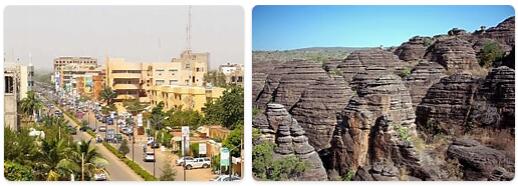The security situation in Burkina Faso has deteriorated considerably in recent years. There have been several terror attacks in the country since 2015, including in the capital Ouagadougou. Kidnappings of Westerners have occurred.
Safety
There have been several terrorist attacks in Burkina Faso in recent years, including three major attacks in the capital Ouagadougou. The last attack in Ouagadougou took place on March 2, 2018. The attacks have been aimed at both civilian and military targets.
The security situation in Burkina Faso has gone from bad to worse in recent years. About one third of the country towards the border with Mali in the north and west, as well as on the border with Niger in the east, is now characterized by rebel and terror groups. Attacks on civilians are becoming more frequent, affecting Christian opinions in particular. Extremist groups move across borders and operate relatively freely in the border areas towards Mali in the north and west.
Over the past year, the security situation in the east of the country has worsened significantly with several attacks against Burmese security forces and economic operators (especially mining companies). There have also been kidnappings of westerners in Burkina Faso, in the border areas against Mali in the north and east.
Travelers are encouraged to avoid traveling in areas where demonstrations and public gatherings are listed. One should follow local news and keep up to date on the possibilities of entry or exit.
Normally, the greatest risk to Norwegian travelers in Burkina Faso, as elsewhere in Africa, is linked to traffic accidents, theft and profit crime, and a poor health service. Travelers are encouraged to take reasonable precautions and avoid traffic at night, especially outside the capital Ouagadougou.
There is no particular danger to natural disasters in Burkina Faso, but some areas are regularly hit by floods and droughts.

Entry
Please note that entry regulations may change. The Foreign Service is not responsible if the following information on entry regulations or visa requirements is changed at short notice. It is the responsibility of the traveler to ensure that travel documents are valid for entry and to familiarize themselves with the current entry rules for each country.
There is a visa requirement for Norwegian citizens, and visas must be obtained in advance. Contact Burkina Faso’s embassy in Copenhagen for more information.
Together with the passport, which must be valid for the entire travel stay and six months after departure, a health vaccination card must be brought. Vaccines for yellow fever are required and in addition, vaccines for diphtheria, tetanus, whooping cough and poliomyelitis are recommended. A valid vaccination card must be presented on arrival. As of February 25, 2020, no cases of persons infected with the coronavirus have been registered, but body temperature control at the airport has been implemented.
Health
Burkina Faso is on the World Health Organization’s list of countries where zika can occur, and the Institute of Public Health has updated health advice for pregnant women and other travelers to travel to these areas.
The standard of local hospitals is generally poor, but there are some private and local clinics that are designed for easier treatments. More comprehensive operations should be undertaken in Europe. The pharmacies have a basic range of medicines. Malaria prophylaxis is recommended, especially during the rainy season (May-September).
Practical information
Responsible Norwegian Embassy for Burkina Faso is the embassy in Bamako, Mali. There is limited capacity for monitoring Norwegian nationals in the country. The UD’s 24-hour operational center in Oslo can be contacted on tel. +47 23 95 00 00 in case of emergency.
The capital is Ouagadougou. Other major cities are Bobo-Dioulasso, Banfora, Koudougou and Ouahigouya.
French is the official language. The most important African languages are mossi, various mandible dialects, ugly, guormanch¨¦ and bissa.
Currency is the Central African Franc (CFA). There are ATMs in Ouagadougou, around tourist resorts, hotels and at the airport. Some hotels accept payment by credit card and then primarily Visa. Local currency unit CFA 1000 = NOK 15. According to allcitycodes, country code/area code +226. There are several local mobile networks such as Orange and MTN. Current is 220 volts.
Burkina Faso is a secular state with a blend of Islam and Christian faiths rooted in traditional African faith. It is estimated that 60 percent are Muslim, 25 percent Christian (primarily Catholic) and 15 percent follow traditional beliefs. Local traditions and customs should be respected, especially during the fasting month of Ramadan. Avoid taking pictures of people without permission. Photographic equipment must not be used near military facilities.